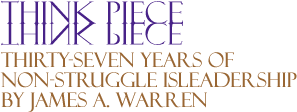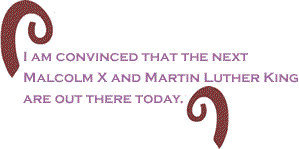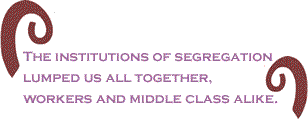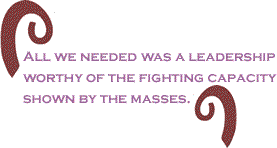
|
|||||||||||||||||||||
 |
After hearing as much as I can stomach from Bill Cosby and his like-minded defenders I have to say something or I’ll burst with frustration. Cosby’s views are the views of a significant layer of the Black middle class, as well as Black elected officials, and leaders of the nonexistent civil rights movement. If you add to the equation the tiny but visible vocal rightwing and conservative elements – Colin Powell, Condoleezza Rice, Clarence Thomas and their co-thinkers – you can find yourself taken aback with the scope and scale of the fundamental shift in the class structure, class differentiation and political polarization in the Black population in the US today. Cosby’s assault on the so-called Black underclass and working people who are Black is a blackface version of the white man’s burden. His bitter resentment and anger is simply a reflection of his view of working people, ignorant helpless victims who’ve failed him in his grand scheme to free them. I think this episode should force us to rethink the place of charity and pity in movements for social change. Charity cases can never be seen as equals by do-gooders. They must prove themselves worthy of a handout. In Cosby’s view we are a waste of his money. So much for charity: private and public, neither is free. While we are at it we can take up the question of “giving back to the community” and the need for the middle class to live among us as role models, before we can realize our humanity. We don’t need their charity, pity or presence. What we need is what we are entitled to and a leadership with an action program and fighting perspective that will allow us to politically demand from the government and both governmental parties the right to a job at union scale as a first step in our entitlement. We hate being turned into charity cases. Class Differentiation
Those of us fighting for social progress should step back, take in this Black middle class backlash and attempt to place it in historical context. We should do so in a thoughtful and cold-blooded manner, without emotion, free of race baiting, and name-calling. I think we have to start at the beginning to fully appreciate, understand and explain this historic change we are living through, which began in the early 70s and is rotten to the core today. I submit that we are at the end of a process, not the beginning. The origin of the class differentiation in the Black population (now complete) is rooted in the aftermath of the victory of the Civil Rights Movement. The overthrow of the Jim Crow system reversed an 85-year catastrophic defeat of Blacks and all working people in this country, which was the violent overthrow of the Radical Reconstruction Governments in the South. Jim Crow like slavery was an expansionist system resulting in Jim Crow segregation in the South and “James Crow” segregation in the North. In both cases the class composition of the Black population was overwhelmingly working class, with a vast majority resident in the South. For the most part the Black middle class was economically based on the institutions of segregation which lumped us all together, workers and middle class alike in the same boat. Middle class leadership/working class base The leadership of practically every effort of resistance was led by middle class figures. They couldn’t speak for their interest without speaking for ours. After 85 years of appealing to the ruling class and its parties they finally figured it out and appealed to the masses. Where else could they turn? Not the courts or the Federal Government. The Brown vs. Board of Education decision was not the product of the brilliance of Thurgood Marshall or the goodwill of the Supreme Court. It was a product of the rise of the colonial revolution especially in Africa, the widespread militant resistance to the segregated military during WWII, and the genocidal casualties for Black troops during the Korean War. Above all it was the product of a change in mood and expectation among the masses. The federal government under Eisenhower and Kennedy refused to do what was called for – a general mobilization of federal troops to every nook and cranny of the South to suppress the racist resistance. The Dixiecrats were the lynchers and murderers. People were ready to fight, what they needed was a call to battle. And when the call went out the response shocked even those that issued it. It’s not enough to see the importance of the victory, we must see clearly without sentimental blinders, how this victory was won. The Civil Rights Movement was an uprising of an oppressed nationality as well as a massive section of the working class in a whole region of the country. Starting with the Montgomery bus boycott, through the sit-ins, it was a sustained, organized, disciplined movement that went on for months and years. It did not draw in active participation of broad layers of the US population but it went deep into the heart of the Black masses; this movement touched millions upon millions from 1954 to1964. Following the victory the question of which way forward was posed. Post-Civil Rights Movement Challenge
The fight against the Jim Crow system had a clear target to focus on with only one option: fight against it. The demand was to dismantle the system and the tactic was mass mobilizations. The objective conditions forced the leadership to place its eyes on the masses, to appeal to them to challenge the entire social structure, what they called the power structure. They challenged “the Government” and “the Courts,” all of them, Democrat and Republican alike. We looked to ourselves, we fought them all and we won. Would we continue to fight for social and economic justice once we won equality under the law or would those that fought the real fight be sent packing? This was the question of the day in the late Sixties. Unlike the Radical Reconstruction Governments, this was a victory we won – it was not dependent on the Federal Government and its troops. The victory over Jim Crow opened the door for us to advance our struggle for freedom far beyond anything we had ever enjoyed in this country since our kidnapping and enslavement. All we needed was a leadership worthy of the fighting capacity shown by the masses. The only organization to advance such a program that addressed itself to the masses and saw the masses as the masters of their own destiny was the Organization of Afro-American Unity (OOAU), founded by Malcolm X and other far sighted and gifted leaders. Following Malcolm’s assassination the outfit fell on hard times and eventually faded as a valuable force. The fact is 40 years later the OOAU program stands up very well. It could easily be reworked and utilized as a program of action today. Demobilization and retreat
From the Southern Christian Leadership Conference, to the Student Nonviolent Coordinating Committee, Operation PUSH, The Panthers, The US organization, NAACP, The Nation of Islam, or the many regional and local organization, the challenge was the same: Where do you stand on continued mobilization and what type of program do you advance? A general debate did develop, in which you could hear everything from socialist rhetoric, to picking up the gun, to arguing for a mad rush into the Democratic Party. Ultimately the vast majority agreed that supporting the Democrats was the way to go. The majority also agreed that there was no place for those that overthrew Jim Crow, the masses, except to vote every four years and occasionally be called out in the streets, not in militant antigovernment protest but for lobbying efforts. The 1972 Black political convention threatened to organize a Black political party. With a reported 10,000 people in attendance it had the potential to do so but when no party was formed or even called for in the future it went into decline the day after the convention. I attended the convention; the lack of democracy and the heavy-handed conduct of the organizers guaranteed that short of a rebellion from the ranks not much would come out of the convention. It was by far one of the greatest disappointments of my life. A remnant of the ‘72 convention called the National Black Political Assembly transformed itself into the National Black Independent Political Party but the majority of the leadership was more interested in organizing purges of those they disagreed with than taking the NBIPP’s outstanding program of action, the Freedom charter, to the ranks and the masses. The NBIPP was slowly organized out of existence by the leadership, in the mid-1980s. Thus ended the last live organizational link with the political ferment and debate coming out of the radicalization of the 1960s. The last attempt at a nationwide massive action was the 1968 SCLC-led Poor People’s March, which started in Memphis following Dr. King’s assassination and went through Mississippi and other areas and ended up as a tent city in Washington DC. I left high school with two friends to participate in this action, which I saw as an answer to Dr. King’s assassination. We were “rescued “ by my friend’s father and taken back home before we got to DC. 70s mad dash for the cash With the assassination of Dr. King and Malcolm X, the two most authoritative voices in the fight for Black rights were removed from the stage. They both died practically penniless. They were not in the business of making money off our misery. The leaders they left behind in their vast majority had a different inclination. LBJ’s War on Poverty and Great Society programs, and the openings in the Democratic Party, slowly co-opted the bulk of these ex-mass leaders. The FBI’s Cointelpro program claimed the lives of some of the leaders of the Panthers like Fred Hampton while prisons claimed others. The problem was whether they saw themselves as reformers or revolutionaries they all in one form or another reduced the masses who overthrew Jim Crow into observers and victims instead of what they were, the most powerful agents for social change in our nationality. This is true for all the oppressed and exploited the world over. Once freed from the responsibility of organizing and mobilizing thousands of people, the reformers were able to pursue their hearts’ desires, self-glorification and enrichment. After a 35-year orgy of money hoarding and self indulgence they looked around and saw that while they had advanced far beyond their wildest imaginations the majority of Blacks have been pushed back to levels of poverty and hopelessness worse than under Jim Crow. This process of re-segregation has devastated forty percent of the Black population. Interests not mutually exclusive The most outrageous fact in this entire matter is that the interests of the Black middle class and the Black masses are not mutually exclusive. Old husband tales aside, the Black middle class is not our ruling class and they never will be. They are not our employer; in fact if we had to depend on them for employment Black unemployment would be at 95%. This political polarization is the product of the failure of the middle class and Black elected officials to deliver on the promise of 35 years ago. The ten thousand Black elected officials and the tens of thousands who joined the ranks of the Black middle class have no impact on the quality of life for the Black masses. The fact is they could have flocked into the twin parties of American capitalism and continued to mobilize people in the streets to defend all of our interest. They chose to turn their backs on us. As the youth say, “We ain't mad at ya,” but you need us more than we need you. Political polarization/ their answer to Re-segregation
Instead of addressing the problems faced by the masses today they go on a political offensive to blame the masses for their plight. Cosby, Rock, Winfrey and the others remind me of Malcolm’s description of this type standing there with a big cigar in their mouth telling us how great things are – “Fire on one end and fool on the other.” Over 40 years later the more they pretend to change the more they stay the same. If the truth be told we are their most powerful defenders today. We even celebrate their riches. We place them first – they place us last. Their conduct today is forcing working people to slowly figure this out. They dismantled the mass movement; they transformed the old civil rights organizations from vehicles at the service of the mass movement into instruments for the preservation and reproduction of the middle class. They separated their fight to remain a part of the middle class from our fight for social and economic justice as a human right. They stood aside and allowed us to be beaten down and driven back into “James Crow” – equality under the law and resegregation in fact. Prosperity and depression As the middle class enjoyed the benefits of their upward mobility, the working class and its sons and daughters were left to fend for themselves. Under the impact of the creeping economic crisis, the low point being the 1987 stock market crash, growing layers of the masses were driven into Great Depression-type conditions. Demoralization, hopelessness and despair envelop larger and larger sections of the youth. Political and social ignorance and backwardness replace the Black and human solidarity so pervasive during the Civil Rights Movement and the Black Power revolt. Black solidarity handshakes are replaced with gang signs. The massive influx of drugs reaches epidemic proportions. Today, commodity fetishism defines the worth and value youth place on themselves instead of what hero you read, or the march you participated in, which was true when I was coming of age. If you strip away the nasty language and the fatalism from the dominant voices in Hip-Hop you will hear the values of the Black middle class. Get rich or die trying. Get money, make money, I ride this, I wear that, I live in a mansion, I own big bling; these youth see Black elected officials, the so called Black leaders, and the Black middle class doing the same thing they are doing. But unlike the misleadership class, the youth can change and many will. What they need is to see a movement for social change that they can become a part of. These youth do not see their parents as role models – they are following the lead of the Black mis-leadership. Quit slamming the youth, you reap what you sow. No struggle no progress
The most misunderstood slogan in the fight for Black rights is, “No Struggle No Progress.” Outside the framework of social struggle, progress is out of the question. The problem is, you can be pushed back if there is no struggle. Properly understood this is not a slogan you chant at marches, it’s the rallying cry. It’s what you say to people you are attempting to mobilize. It is the beginning of knowledge. The struggle by its very nature must develop outside the framework of the twin dead skunks in the middle of the road, the Democrat and Republican parties. Without struggle we loose on all fronts. We loose ground socially; the social safety net is snatched away. We loose ground economically. Above all we loose ground in consciousness; human and Black solidarity are the first casualties. In fact Black and human solidarity today are defined by if you voted for a Democrat or not – what would Malcolm X be characterized as? For 37 years we have been led on a non-struggle idiot march to where we are today: economic depression, social devastation, backwardness and ignorance. Not because the youth have not bought into the grand illusion “go to school and live the good life.” But because they have not been organized in the streets to stand up to the government and demand that they be shown the same respect for their lives that is shown to others. Eyes on the prize Those of us who saw the documentary “Eyes on the Prize” got a glimpse of the scope and scale of the last great powerful upsurge in the fight for Black rights. As I watched, I couldn’t help but wonder how many people get the real point. The majority of humanity will free themselves or they will never be free. The prize is the ranks mobilized. Our most prized possession is the ordinary working class men and women waking up as if from a deep sleep, radicalizing and demanding a better life. There is no force on the face of the earth capable of stopping an oppressed people determined to be free if they have a leadership worthy of their fighting capacity. I think we are in the early stages of such an awaking today, not only amongst Blacks but working people as a whole. In the first stages of this awakening we will run into the arms of leaders from this layer who claim to stand with us. But this will be a brief pause on the road to looking to our own class for leadership. Those of us with the political imagination to see this future of massive struggle coming towards us must prepare today by doing the right thing. I am convinced that the next Malcolm X and Martin Luther King are out there today. Our job is to set a framework of struggle that will maximize the possibility they will step up to the plate. For 37 years we have failed to do so. It’s time for a change. James Warren has been active in the Black and Labor movement for over 35 years. He is currently resident in Manhattan, New York where he is writing a personal history of his experiences in the movement. He can be contacted at [email protected]. |
| March 17 2005 Issue 130 |
|||||||||
|
|||||||||
|
|
|||||||||
| Printer Friendly Version | |||||||||
 |
|||||||||
 |
|||||||||
| |
|||||||||
| |
|||||||||





























